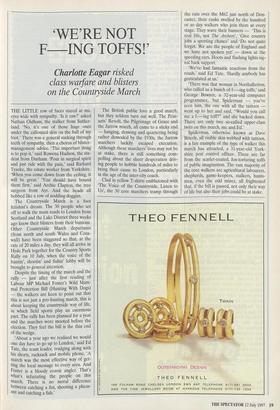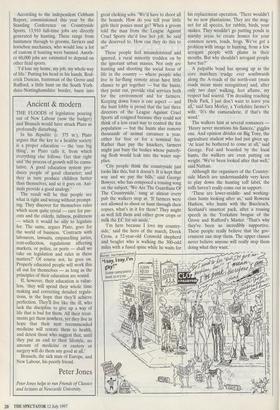`WE'RE NOT F ING TOFFS!'
Charlotte Eagar risked class warfare and blisters on the Countryside March THE LITTLE row of faces stared at me, eyes wide with sympathy. 'Is it raw?' asked Nathan Oldham, the stalker from Suther- land. 'No, it's one of those huge ones under the calloused skin on the ball of my foot.' There was a general sucking through teeth of sympathy, then a chorus of blister- management advice. 'The important thing is to pop it,' said Rowena Hudson, the stu- dent from Durham. 'Pour in surgical spirit and just ride with the pain,' said Richard Tyacke, the estate worker from Yorkshire. `When you come down from the ceiling, it will be great.' You should have bound them first,' said Archie Clapton, the tree surgeon from Ayr. And the heads all bobbed like a row of nodding doggies.
The Countryside March is a foot fetishist's dream. The 30 people who set off to walk the main roads to London from Scotland and the Lake District three weeks ago know their blisters from their bunions. Other Countryside March departures (from north and south Wales and Corn- wall) have been staggered so that, at the rate of 20 miles a day, they will all arrive in Hyde Park together for the Country Sports Rally on 10 July, when the voice of the huntin', shootin' and fishin' lobby will be brought to general attention. Despite the timing of the march and the rally — just after the first reading of Labour MP Michael Foster's Wild Mam- mal Protection Bill (Hunting With Dogs) — the walkers are keen to point out that this is not just a pro-hunting march, this is about keeping the countryside way of life, in which field sports play an enormous part. The rally has been planned for a year and the marches were mooted before the election. They feel the bill is the thin end of the wedge. `About a year ago we realised we would one day have to go up to London,' said Ed Tate, the team leader, trudging along with his shorts, rucksack and mobile phone. 'A march was the most effective way of get- ting the local message to every area. And Foster is a bloody coarse angler. That's what's infuriating the people on this march. There is no moral difference between catching a fox, shooting a pheas- ant and catching a fish.' The British public love a good march, but they seldom turn out well. The Peas- ants' Revolt, the Pilgrimage of Grace and the Jarrow march, all came to a sticky end — hanging, drawing and quartering being rather demoded by the 1930s, the Jarrow marchers luckily escaped execution. Although these marchers' lives may not be at stake, there is still something com- pelling about the sheer desperation driv- ing people to hobble hundreds of miles to bring their cause to London, particularly in the age of the inter-city coach. Clad in yellow T-shirts emblazoned with `The Voice of the Countryside. Listen to Us', the 30 core marchers tramp through the rain over the M62 just north of Don- caster, their ranks swelled by the hundred or so day walkers who join them at every stage. They wave their banners — 'This is real life, not The Archers', 'Give country jobs a sporting chance' and 'Do not quite forget. We are the people of England and we have not spoken yet' — down at the speeding cars. Hoots and flashing lights sig- nal back support.
`We've had fantastic reactions from the roads,' said Ed Tate. 'Hardly anybody has gesticulated at us.'
`There was that woman in Northallerton, who called us a bunch of f—ing toffs,' said George Bowyer, a 32-year-old computer programmer, 'but Spiderman — you've seen him, the one with all the tattoos went up to her and said, "Would you call me a f—ing toff?" and she backed down. There are only two so-called upper-class twits on this march, me and Ed.'
Spiderman, otherwise known as Dave Brierly, all visible skin webbed with tattoos, is a fair example of the type of walker this march has attracted, a 31-year-old York- shire pest control officer. These are far from the scarlet-coated, fox-torturing toffs of public imagination. The vast majority of the core walkers are agricultural labourers, shepherds, game-keepers, stalkers, hunts- men, even the odd miner, all frightened that, if the bill is passed, not only their way of life but also their jobs could be at stake. According to the independent Cobham Report, commissioned this year by the Standing Conference on Countryside Sports, 13,910 full-time jobs are directly generated by hunting. These range from huntsmen through to grooms, farriers and horsebox mechanics, who would lose a lot of custom if hunting were banned. /moth- er 60,000 jobs are estimated to depend on other field sports.
`I'd lose my home, my job, my whole way of life.' Putting his head in his hands, Rod- erick Duncan, huntsman of the Grove and Rufford, a little hunt on the South York- shire-Nottinghamshire border, burst into great choking sobs. 'We'd have to shoot all the hounds. How do you tell your little girls their ponies must go? When a groom told the man from the League Against Cruel Sports she'd lose her job, he said she deserved to. How can they do this to us?'
These people feel misunderstood and ignored, a rural minority trodden on by the ignorant urban masses. Not only are hunting and shooting the social focus of life in the country — where people who live in far-flung remote areas have little chance to get together — but the hunts, they point out, provide vital services both for the environment and for farmers. Keeping down foxes is one aspect — and the hunt lobby is proud that the last three directors of the League Against Cruel Sports all resigned because they could not think of a less cruel way to control the fox population — but the hunts also remove thousands of animal carcasses a year, either for free or for a nominal fee. Rather than pay the knackers, farmers might just bury the bodies whose putrefy- ing flesh would leak into the water sup- plies.
`City people think the countryside just looks like this, but it doesn't. It is kept that way and we pay the bills,' said George Bowyer, who has composed a rousing song on the subject, 'We Are The Guardians Of The Countryside,' sung at almost every pub the walkers stop at. 'If farmers were not allowed to shoot or hunt through their copses, what's in it for them? They might as well fell them and either grow crops or milk the EC for set-aside.'
`I'm here because I love my country- side,' said the hero of the march, Derek Cross, a 52-year-old Cotswold shepherd and beagler who is walking the 300-odd miles with a fused spine while he waits for his replacement operation. 'There wouldn't be no new plantations. They are the mag- net for all species, for rabbits, birds, your snakes. They wouldn't go putting ponds in marshy areas to create homes for your common newts, toads, frogs. We've got a problem with image in hunting, from a few arrogant people with plums in their mouths. But why shouldn't arrogant people have fun?'
A palpable bond has sprung up as the core marchers trudge ever southwards along the A-roads of the north-east (main roads mean more recognition) and, after only two days' walking, feet aflame, my respect had soared. 'I'm dreading reaching Hyde Park, I just don't want to leave you all,' said Sara Morley, a Yorkshire farmer's wife. 'It's the camaraderie, if that's the word.'
The walkers hint at several romances 'Henry never mentions his fiancée,' giggles one. And opinion divides on Big Tony, the agriculture student who had just given up. `At least he bothered to come at all,' said George. Fed and boarded by the local hunts, the walkers are even putting on weight. 'We've been looked after that well,' said Nathan.
Although the organisers of the Country- side March are understandably very keen to play down the hunting toff label, the toffs haven't really come out in support.
`These are lower-middle- and working- class hunts looking after us,' said Rowena Hudson, who hunts with the Buccleuch, Scotland's smartest pack, after a rousing speech in the Yorkshire brogue of the Grove and Rufford's Master. 'That's why they've been so incredibly supportive. These people really believe that the gov- ernment can stop them. The upper classes never believe anyone will really stop them doing what they want.'



























































 Previous page
Previous page